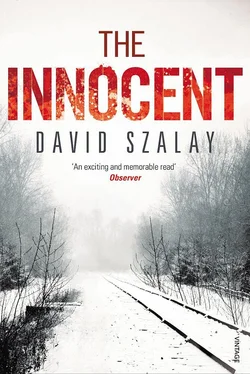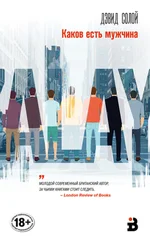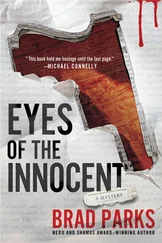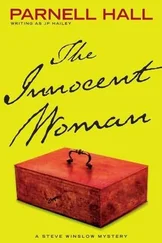They stay in the banya for ten or twelve minutes, no more, and even then Ivan is a little light-headed when they emerge. ‘Might have overdone it today,’ he says, though they were in there for no longer than usual. The showers are simply huge spigots, with old-fashioned wooden handles, from which pours water, icy or piping hot.
Grisha, one of the predbannik attendants, a teenager, has been sent out for vodka. While they wait for him, they eat pork fat, smoked fish and bread. Someone is talking about football, about Yerevan, the first-division team. ‘They play like Europeans,’ he is saying. ‘They’re individualists. They’ll shout at the ref if they don’t agree with him …’ Someone else – he must be fiftyish, with large flaccid muscles and a handlebar moustache – is telling a joke. ‘Igor says to Yegor, “You know what, I think my wife might be cheating on me.” “Oh yeah,” Yegor says. “Who with?” “A florist.” “What makes you think that?” “Because when I got home unexpectedly the other day, I found this rose on the table.” “Right.” So Yegor thinks for a minute, then he says, “You know what? I think my wife might be cheating on me too.” “Yeah?” Igor says. “Who with?” “A fella that works on the railway.” “What makes you think that?” “Well, when I got home unexpectedly the other day, I found her in bed with this fella that works on the railway.”’ Laughter. The joke-teller looks pleased with himself. He is a mass of tattoos. Prominent on one shoulder is ‘STALIN’, on the other ‘LENIN’. Nodding towards these with an ironic smile, Ivan says, ‘Like the tattoos.’ The joke-teller stares at him menacingly. Everyone laughs. ‘Yeah, well.’ He shrugs, inspecting himself. ‘They were fashionable once, but now … You know …’ More laughter. Someone says, ‘In the West they do tattoos without needlework. That’s what I heard. They just sort of stamp them on you.’
When Grisha arrives with the vodka they let him have a shot, and he sits there sniffing it. His long hair comes down over the filthy collar of his jacket, and its lapels are covered with pins – presents from tourists, mostly from the fraternal nations, whom he met while working in a Crimean spa open to foreigners. He’s most proud of one a Canadian woman gave him, a little red-and-white Canadian flag. He says he’d like to go to Canada, France and Japan. He says in those countries everyone has their own car, even ordinary workers. ‘Well, I don’t know about France or Canada,’ Ivan says, ‘but Japan …’
Aleksandr has heard what follows innumerable times. To listen to Ivan, he thinks, opening his locker, you would suppose that he had lived in Japan for twenty years, not spent two heavily supervised weeks in suburban Tokyo, shuttling to and from his hotel and the Olympic stadium. Grisha, however, is obviously impressed. So are some of the others. Soon, in fact, everyone is listening to Ivan. He says that yes, the streets are filled with cars – and what cars! Of course, he points out sternly to Grisha, Japan is a vassal state of the USA, and as such not to be envied – he offers him a Golden Fleece, which Grisha timidly takes – but what cars! They start first time, travel smoothly, never stall or judder or squeak. They are spacious and fragrant. And so many of them! The Soviet Union, he says, must learn to make such cars.
IF YOU HAVE forgotten this, Ivan, let me jog your memory – it is a summer night in 1948. I am knocking on the door of your mistress’s flat. The stairwell smells of sewage. And the situation with Lozovsky is in a sort of stalemate. Suvorov, that odious obkom weasel, has said that he will not move him from his post. Suvorov – I don’t know if you know this, Ivan – Suvorov turned out to be an old university pal of Lozovsky’s. Sitting at his desk in his natty striped suit, smoking a foreign cigarette, he said to me, ‘Yes, we knew each other in the twenties.’ And he smiled his moustachioed smile. ‘Several lifetimes ago. I wasn’t in his league of course. He’s an extra ordinary talent. Extraordinary!’ The showy smile. ‘I’m not – I went into politics.’ He thought that was very funny.
I said, ‘You’ve known each other since then, since the twenties?’
He stopped smiling. ‘No, no, not exactly. We were friends at university. Then we lost touch. I ended up here. He stayed in Moscow, of course. Sometimes I saw his picture in the papers. When he won the Stalin prize, for instance.’
‘And then?’
‘Then, well, then he and his wife moved out here, with the university. In forty-one …’ In forty-one, as the Nazis sliced through our western districts, Moscow University was evacuated to Sverdlovsk. ‘We saw them socially, my wife and I,’ Suvorov went on, ‘until they moved to …’ He smiled and shook his head. ‘I forget the name …’
‘Metelyev Log.’
‘Yes. When was it? Forty-four?’
There was a small wooden box on his desk which he opened – it was full of foreign cigarettes, as fat and white as maggots. He offered me one – ‘No, thank you’ – then lit one himself, with a silver lighter. ‘In fact I tried to dissuade him from taking that job,’ he said, in a puff of smoke. ‘He wouldn’t listen.’
Why not?
‘He wanted it. He specifically asked for it.’
Why did he want it?
‘I don’t know.’
‘You must have asked him,’ I said politely. ‘If you tried to dissuade him from taking it.’
‘It doesn’t mean I got an answer!’ The smile faded. He shrugged. ‘I imagine it was to focus on his work,’ he said. ‘His scientific work. He felt he had a unique opportunity. He said that. Or something like that.’
‘A unique opportunity?’
‘Yes, a unique opportunity.’
‘What did he mean by that?’
‘You know,’ Suvorov said, ‘I have no idea.’
And since then, since Lozovsky moved to Metelyev Log, had he seen much of him?
He stuck out his lower lip and shook his head. ‘No,’ he said. ‘Not much.’ This seemed straightforward enough, until I asked him when he had last seen or spoken to Lozovsky. ‘Well …’ he said. ‘On Monday.’
‘Monday? This Monday?’
‘Yes.’
Now somewhat wary, Suvorov said, ‘Yes, I spoke to him on Monday. On the telephone.’
And what had he wanted?
He had wanted to warn his old friend, now a senior member of the obkom, that there might be a move to ease him out of his post at Metelyev Log, and that he did not want to be eased out of it, and that whatever story Suvorov might hear from the MGB, the reason they wanted him out was that he had not signed a form four-eighty in respect of one of his patients, and that he had not signed it for perfectly valid medical reasons. ‘And if that’s the case,’ Suvorov said, with a sad smile, ‘I don’t see what you want me to do.’
Mikhalkov took this unexpected move of Lozovsky’s personally. He was furious, and the immediate target of his fury was me. Why had I made such a mess of this simple task? Why didn’t I just do what he wanted? Why did I always find some new problem? I stood in his office, staring at the blue carpet. I was surprised how strongly he felt about the situation. I did not fully understand its importance to him. What was obvious was that Lozovsky had not signed the form because he did not think he needed to; he knew that he was on the nomenklatura, and that through his friend Suvorov the obkom would obstruct our efforts to move him.
For a week or two I heard no more about it. Then, one afternoon, I was summoned to Mikhalkov’s office.
‘You’ve got a journalist brother, haven’t you?’ he said.
‘Yes.’
‘I want you to have a word with him.’
And that is why I found myself trudging up the stairs to your mistress’s flat, Ivan. I’ve forgotten her name. Perhaps you have too. When I went to your flat, Katya told me that you were working late. Her face shone with sweat, and she was fanning herself with a folded newspaper. ‘And you – are you well?’ I said. ‘You shouldn’t smoke, you know.’ She let me take the papirosa from her hand. ‘You should look after yourself.’ I left, feeling implicated in your lies to her. I did not look for you at the newspaper offices. I knew I wouldn’t find you there.
Читать дальше












